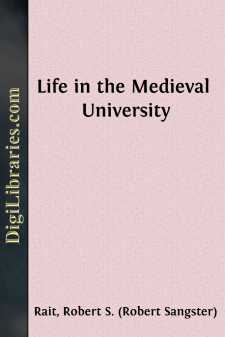Categories
- Antiques & Collectibles 13
- Architecture 36
- Art 48
- Bibles 22
- Biography & Autobiography 813
- Body, Mind & Spirit 142
- Business & Economics 28
- Children's Books 15
- Children's Fiction 12
- Computers 4
- Cooking 94
- Crafts & Hobbies 4
- Drama 346
- Education 46
- Family & Relationships 57
- Fiction 11829
- Games 19
- Gardening 17
- Health & Fitness 34
- History 1377
- House & Home 1
- Humor 147
- Juvenile Fiction 1873
- Juvenile Nonfiction 202
- Language Arts & Disciplines 88
- Law 16
- Literary Collections 686
- Literary Criticism 179
- Mathematics 13
- Medical 41
- Music 40
- Nature 179
- Non-Classifiable 1768
- Performing Arts 7
- Periodicals 1453
- Philosophy 64
- Photography 2
- Poetry 896
- Political Science 203
- Psychology 42
- Reference 154
- Religion 513
- Science 126
- Self-Help 84
- Social Science 81
- Sports & Recreation 34
- Study Aids 3
- Technology & Engineering 59
- Transportation 23
- Travel 463
- True Crime 29
Life in the Medieval University
Description:
Excerpt
INTRODUCTORY
"A Clerk ther was of Oxenford also,
That unto logik hadde longe y-go
As lene was his hors as is a rake,
And he was not right fat, I undertake;
But loked holwe, and therto soberly,
Ful thredbar was his overest courtepy,
For he had geten him yet no benefyce,
Ne was so worldly for to have offyce.
For him was lever have at his beddes heed
Twenty bokes, clad in blak or reed,
Of Aristotle and his philosophye,
Than robes riche, or fithele, or gay sautrye.
But al be that he was a philosophre,
Yet hadde he but litel gold in cofre;
But al that he might of his freendes hente,
On bokes and on lerninge he it spente,
And bisily gan for the soules preye
Of hem that yaf him wherwith to scoleye,
Of studie took he most cure and most hede,
Noght o word spak he more than was nede,
And that was seyd in forme and reverence
And short and quik, and ful of hy sentence.
Souninge in moral vertu was his speche.
And gladly wolde he lerne, and gladly teche."
An account of life in the medieval University might well take the form of a commentary upon the classical description of a medieval English student. His dress, the character of his studies and the nature of his materials, the hardships and the natural ambitions of his scholar's life, his obligations to founders and benefactors, suggest learned expositions which might
in judicious hands
Extend from here to Mesopotamy,
and will serve for a modest attempt to picture the environment of one of the Canterbury pilgrims.
Chaucer's famous lines do more than afford opportunities of explanation and comment; they give us an indication of the place assigned to universities and their students by English public opinion in the later Middle Ages. The monk of the "Prologue" is simply a country gentleman. No accusation of immorality is brought against him, but he is a jovial huntsman who likes the sound of the bridle jingling in the wind better than the call of the church bells, a lover of dogs and horses, of rich clothes and great feasts. The portrait of the friar is still less sympathetic; he is a frequenter of taverns, a devourer of widows' houses, a man of gross, perhaps of evil, life. The monk abandons his cloister and its rules, the friar despises the poor and the leper. The poet is making no socialistic attack upon the foundations of society, and no heretical onslaught upon the Church; he draws a portrait of two types of the English regular clergy. His description of two types of the English secular clergy forms an illuminating contrast. The noble verses, in which he tells of the virtues of the parish priest, certainly imply that the seculars also had their temptations and that they did not always resist them; but the fact remains that Chaucer chose as the representative of the parochial clergy one who
"wayted after no pompe and reverence,
Ne maked him a spyced conscience,
But Cristes lore, and his apostles twelve,
He taughte, but first he folwed it himselve."
The history of pious and charitable foundations is a vindication of the truth of the portraiture of the "Prologue." The foundation of a new monastery and the endowment of the friars had alike ceased to attract the benevolent donor, who was turning his attention to the universities, where secular clergy were numerous....



